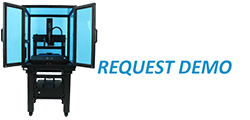Profilometer Brakes New Ground Break New Ground
Irvine CA, December 02, 2008 — Nanovea announced today that it’s non contact profiler line-up will now include a system with measurement speeds over 180 times faster. With this new advancement Nanovea’s Profilometerwill now have the capability to reach speeds suitable for more time constraint production and quality control environments. This new advancement in Profilometer Technology is a breakthrough for use within these particular environments. Prior to this new advancement this profiling technique had required a point-by-point measurement, which acquired single data points while the sample being measured moved back-and-forth under the optics to create 3D mapping. With this new technology there will be line of 180 measureable points that will be acquired simultaneously, which will significantly decrease the time to create a 3D mapping of the surface. “I’m excited about this new capability; this will give us the ability to work with new markets that require high throughputs.” Said Craig Leising, Product Manager, Nanovea. The new Profilometer System uses 1 x 180 array of measurement points and can scan up to 1800 lines per second to create and overall scan rate of up to 324,000 points per second. The system will be capable of measuring large areas in seconds with high resolution and can be equipped with image recognition software for high speed inspection. Options will also include a scanning mirror to create a field scanning function that will measure 180 points by 230 lines. Custom inline system will also be available.
Nanovea’s Patent Pending Non-Contact Optical Depth Sensing Technique
Irvine CA, October 20, 2008 — Nanovea has Patent Pending on Non-Contact Optical Depth Sensing for Instrumented Indentation and Scratch Testing. The “Revolutionary” non-contact technique delivers 100% accurate height measurements during micro/macro scratch and hardness testing. Prior to this new advancement any testing would require mechanical surface contact, which was impossible during sample movement, to take in account substrate and machine compliance. Now with the ability to observe the precise depth of the indenter without touch, sample motion is no longer an issue and true depth of the indenter can be directly recorded. “We are very excited about our new technique and look forward to showcasing its superior results,” Said Pierre Leroux, General Manager, Micro Photonics Surface Test Division. “We are consistently looking for new ways to provide instruments that are as progressive as the solutions their intended for; I think this technique does just that. “The high precision modules for the determination of the Micro/Macro mechanical properties of thin/thick coatings and substrates using instrumented indentation and scratch/adhesion testing. They are ideal for the characterization of industrial coatings; ranging from plasma processed layers, used in semiconductor and optical technology, to decorative and protective coatings, used for automobile parts and consumer goods. Nanovea Micro/Macro Mechanical Testers use independent force and depth sensors to obtain depth-versus-load curves used in instrumented indentation and scratch testing. The result, the fastest and most accurate measuring technique in the industry and capable on any shape & texture of material and resolves challenges associated with the older methods for indenter height measurements such as sinking on soft materials and reference movement on rough surfaces.
Formula Drift Racing Using Material Testing Instruments
Irvine, California – August 2, 2007 – Micro Photonics, announced today the company was named “Official Material Testing Equipment Supplier” for the Formula Drift Professional Racing Series.The sponsorship teams Micro Photonics, a leading provider of instrumentation for material testing and analysis, with Formula Drift Holdings, LLC; the only professional drift racing series in North America. Under the agreement Micro Photonics agrees to provide Formula Drift with instrumentation, and in exchange, Formula Drift grants Micro Photonics all accompanying sponsorship rights and privileges.“Micro Photonics is looking forward to a great relationship with the Formula Drift Professional Racing Series.” Said Pierre Leroux, General Manager, Micro Photonics Surface Test Division. “Since we offer such a diverse selection of instruments, we can provide everything drivers need for equipment verification and quality control. Plus, it’s exciting to be involved with Drift Racing, the interest is tremendous.”Drift racing a highly skilled motor sport that requires drivers to out maneuver their competition by finessing their cars with power slides around a series of corners on a set course, pushing the car’s tire traction to the limits. “Every drift racer on the planet needs a tire durometer!” said Randy Hembrey, Chief Steward Formula Drift Professional Racing Series. The handheld instruments will be used during races to verify tire hardness, critical to race performance.In addition to instrumentation, drivers and staff will benefit from Micro Photonics’ mechanical engineering experience. The alliance also provides an opportunity to build relationships with other Formula Drift Sponsor organizations. Micro Photonics has been a leading provider of material testing instruments and laboratory testing for more than fifteen years. The company specializes in: Nano and Micro Mechanical Testing, X-Ray Micro Tomography, X-Ray Diffraction, 3D Non-Contact Profilometer, Thin Film Analysis, Biological Imaging Instruments and NSOM, SPM & AFM systems.
New Multipen Turret From Micro Photonics Offers Nine Sensor Options in One Assembly
Irvine CA, July 7, 2006 – Micro Photonics Inc. today, introduced the new multi optical pen turret offering greater flexibility in chromatic confocal measurements. Incorporating the multi optical pen turret onto the Profilometer allows users to quickly and easily change optical pens without spending down time removing or adding new pen assemblies. Comprised of three unique magnifiers and three different chromatic lenses, the multi optical pen Turret offers up to nine optical sensor options in a single assembly. The turret easily integrates onto any new or existing Nanovea Profilometer 3D Optical Non-Contact Optical Profiler. Pen combinations are comprised from over thirty different sensor selections available from Micro Photonics. Choices include five magnifiers, ranging from 3.3 mm to 29 mm focal lengths, and six different chromatic lenses, 130 µm to 27 mm depth of fields. Pen combinations can achieve maximum axial resolution of 5 nm, accuracy to 20 nm and max slope to 87º for diffusive objects. This Nanovea Micromeasure option is available exclusively from Micro Photonics Inc. Micro Photonics has been a leading provider of materials technology instruments and laboratory testing since 1992. The company specializes in: Nano and Micro Mechanical Testing, X-Ray Micro Tomography, Ellipsometery, X-Ray Diffraction, 3D Non-Contact Profilometer, Thin Film Analysis, Biological Imaging Instruments and NSOM, SPM & AFM systems.
Micro Photonics unveils new lower priced modular chromatic confocal optical pens.
Irvine CA, March 24, 2006 – Micro Photonics Inc. today introduced the latest line of chromatic confocal optical pens for profilometry, microtopography, roughness, auto-focus vibrometery, in-line inspection quality control, and thickness measurements. The new modular design allows up to 30 different optical pen configurations for specific depth of field, spot size, working distance, object slope and photometric efficiency. Users can choose from a selection of five magnifiers, ranging from 3.3mm to 29mm focal lengths, and six different chromatic lenses, 130µm to 27mm depth of fields. Pens can achieve maximum axial resolution of 5nm, accuracy to 20nm and max slope to 87º for diffusive objects. Based on white light chromatic aberration, the pens have superior lateral resolution (1.1µm) and vertical resolution (5nm); which make them a better choice than laser triangulation sensors for applications where high resolution measurements are critical, as sometimes found in vibrometry, in-line inspection and quality control applications. For challenging materials such as, textiles, polymers, black or dark blue materials, high aspect ratio surfaces, and materials of low reflectivity, white light chromatic aberration is often the only appropriate technique. Micro Photonics believes new competitive pricing will attract clients who previously considered white light chromatic aberration too expensive. “Clients have known of this technique, and its benefits for OEM applications, but because of the price it was passed on in favor of cheaper laser sensors. The new prices are 40% lower on average, which will make a difference.” said Pierre Leroux, General Manager, Surface Test Division. Acquisition speed to 30,000Hz meets specific vibrometry, in-line and off-line quality control requirements. The system can be used as a stand alone unit or connected to a computer using various software packages. Integrated solutions such as the Micromeasure Profiler and Micromeasure Dual Scanner are also available for complete 3D surface imaging. This technology is available from Micro Photonics Inc. Micro Photonics has been a leading provider of materials technology instruments and laboratory testing since 1992. The company specializes in: Nano and Micro Mechanical Testing, X-Ray Micro Tomography, Ellipsometery, X-Ray Diffraction, 3D Non-Contact Profilometry, Thin Film Analysis, Biological Imaging Instruments and NSOM, SPM & AFM systems.
Micro Photonics Unveils Dual Scanning Profilometer and Scanning Instrument
Irvine CA, January 25, 2005 – Micro Photonics Inc. announced today the latest addition to their line of surface materials testing instruments. The Dual Scanning Profilometer the first of its kind, providing simultaneous thickness and dual profilometry scanning. Secured on a platform between the two pens, the sample stage moves in an x-y direction allowing the two probes to determine a synchronized surface profile. The system software computes the known distance between the pens, with the wavelength of the incident white light reflected from the sample surface, to determine the thickness of the sample at any given point. Utilizing the principle of Chromatic Aberration, two pens pass white light through the objective lens and reflect that light off the sample surface. The lens then collects the wavelength of incident white light and refocuses it in a variable distance from the lens. This exclusive technology is available from Micro Photonics Inc. Micro Photonics has been a leading supplier for materials technology instruments and laboratory testing for over twelve years. The company specializes in: Nano and Micro Mechanical Testing, X-Ray Micro Tomography, Ellipsometery, X-Ray Diffraction, 3D Non-Contact Profilometer, Thin Film Analysis, Biological Imaging Instruments and NSOM, SPM & AFM systems.
Micro Photonics Offers Breakthrough Technology for Temperature Specific Mechanical Testing
Irvine, California – April 22, 2004 – Micro Photonics Inc., a leading provider of surface materials instruments and laboratory services, introduces a breakthrough in materials technology, temperature specific mechanical testing. Researchers can easily attach the heating/cooling module to either hardness or scratch platforms to achieve temperatures between the ranges of -196°C and 600°C. Once in place, the module, consisting of a platinum resistance coil, and nearly fully encapsulating enclosure thusly reducing thermal drift, produces highly stable and accurate temperature control. Utilizing the Nano/Micro Hardness platform also offers another unique advantage: a differential surface-indenter depth technique to counter the effects of natural thermal expansion of the sample under test, a technology not available with other hardness testing instruments. Although the majority of indentation testing is performed at room temperature producing efficient results, the need to investigate the mechanical properties of certain materials at or near their in-service temperatures has grown significantly in recent years, prompting the development of this technology. Micro Photonics offers contract laboratory testing services, instruments, after-sales service and training for a wide range of surface metrology instruments including: nano/micro mechanical testing, friction, wear, adhesion, scratch resistance and fracture toughness. Ellipsometers are available for thin film thickness and optical properties (n&k), and a large array of non-contact surface profiling instruments for studying roughness, dimensional analysis, and radius of curvature and thickness properties. In addition, Micro Photonics offers x-ray microtomograghy instruments for imaging and analyzing internal microstructures.









